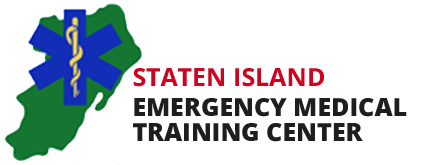National Association of Emergency Medical Technicians Courses
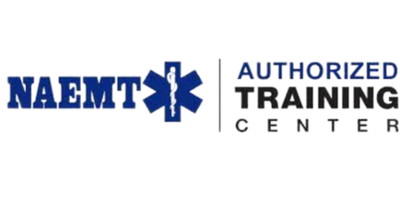
SIEMT is an authorized training center for the National Association of Emergency Medical Technicians. Our NAEMT courses prepare EMS students for the challenges of working in the field and give them the medical skills and knowledge to serve as front-line medical responders in all types of disasters and public health crises.
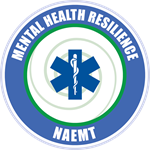
Mental Health Resilience Officer (In-Person)
Healthcare Professional course
Due to the difficult environments EMS personnel encounter every day, and the impact of both direct and vicarious trauma, our EMS workforce has long faced a disproportionate challenge in maintaining their mental health resilience.
The Mental Health Resilience Officer (MHRO) course prepares EMS personnel to serve as their agency’s Mental Health Resilience Officer. In this role, the MHRO will engage with peers to develop an understanding of mental health issues and resilience; identify peers who are experiencing mental health stressors and crises; navigate peers in need to the right services for help; and support the development of a culture of mental health resilience and emotional wellness within the agency.
The course will cover:
The role of a Mental Health Resilience Officer;
the impacts of EMS work on mental health and emotional wellbeing; mental health resilience at the individual, interpersonal, and agency level; communication strategies to engage your colleagues regarding mental health issues;
case studies in EMS mental health; key elements of an effective agency EMS mental health resilience program; and
how to build or strengthen an agency mental health resilience program; and resources to support the MHRO.This course is designed for EMS practitioners who meet the following qualifications:
A minimum, current state certification or license as an EMT;
at least three years of full-time practice (or equivalent) at the EMT level or above, strong interpersonal communication skills with an interest in serving in this position; and prior experience with critical incident stress debriefing (CISD) and/or motivational interviewing is preferred.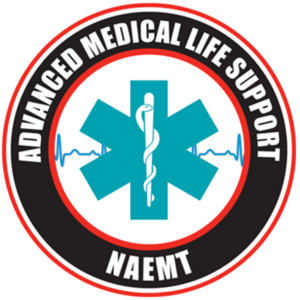
AMLS Hybrid
Healthcare Professional course
AMLS Hybrid Course.
Advanced Medical Life Support (AMLS) remains the gold standard of education for emergency medical assessment and treatment. This course is appropriate for EMTs, paramedics, nurses, nurse practitioners, physician assistants, nurse anesthetists and physicians. Students will learn to recognize and manage common medical crises through realistic case-based scenarios that challenge students to apply their knowledge to highly critical patients. The course emphasizes the use of scene size-up, first impression, history, interactive group discussion on differential diagnosis and potential treatment strategies, and physical exam to systematically rule out and consider possibilities and probabilities in treating patients’ medical crises. Some discussion topics will include, respiratory disorders, cardiovascular disorders, shock, sepsis, neurological disorders, and environmental emergencies.Course Dates TBD
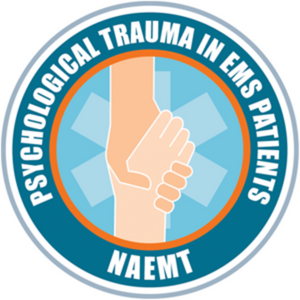
Psychological Trauma in EMS Patients (PTEP) (Virtual)
Healthcare Professional course
The Psychological Trauma in EMS Patients (PTEP) course educates EMS practitioners about the biological underpinnings of psychological trauma, the short and long-term impact on the brain and body, and warning signs that a patient is experiencing extreme psychological distress. EMS practitioners are also taught strategies and techniques to alleviate patients’ distress and help patients cope with what they’re experiencing to ward off lingering effects.
Course date TBD.
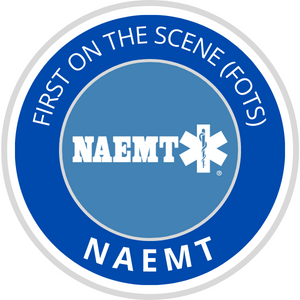
First On The Scene (FOTS) Course
Instructor course
First on the Scene (FOTS), developed by NAEMT and the International Association of Fire Chiefs (IAFC), provides instructors with a toolkit to teach the general public basic emergency response to life-threatening emergencies until EMS arrives on the scene. Through lesson presentations and hands-on skill stations, participants will learn how to access help in the event of a life-threatening emergency and what to do until EMS arrives.
This course covers:
Activating the 911 system
Hands-only CPR and AED
Administering naloxone
Administering epinephrine
Responding to life-threatening bleeding
Penetrating chest trauma
Moving patients to safety
Positioning injured patientsCourse Dates TBD
This class requires a minimum of 4 students. If minimum student registration is not met, the class will be cancelled and monies refunded. 24 student maximum.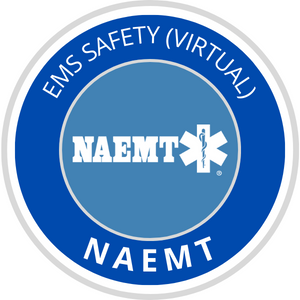
EMS Safety (Virtual)
Healthcare Professional course
EMS Safety teaches students how to protect themselves and their patients while on the job. It promotes a culture of safety and helps reduce the number of on-the-job fatalities and injuries. EMS Safety is the only national, comprehensive safety course for EMS practitioners. Its interactive format features real-life case studies and compelling discussions on current safety issues and provides students with a forum to share their own experiences. Course activities allow students to apply critical thinking and best safety practices to EMS scenarios.
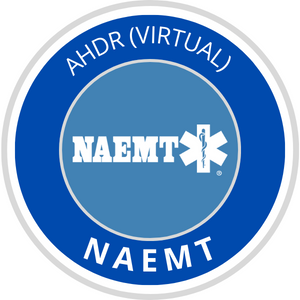
All Hazards Disaster Response AHDR (Virtual)
Continuing Ed course
The All Hazards Disaster Response (AHDR) course teaches students how to respond to the many types of disaster scenarios they may encounter, including natural disasters and infrastructure failings, fires and radiological events, pandemics, active shooter incidents, and other mass casualty events. AHDR educates participants on how to analyze potential threats in their area, assess available resources, and create a response plan that will save lives.

Mental Health Resilience Officer (Virtual)
Healthcare Professional course
Due to the difficult environments EMS personnel encounter every day, and the impact of both direct and vicarious trauma, our EMS workforce has long faced a disproportionate challenge in maintaining their mental health resilience.
The Mental Health Resilience Officer (MHRO) course prepares EMS personnel to serve as their agency’s Mental Health Resilience Officer. In this role, the MHRO will engage with peers to develop an understanding of mental health issues and resilience; identify peers who are experiencing mental health stressors and crises; navigate peers in need to the right services for help; and support the development of a culture of mental health resilience and emotional wellness within the agency.
The course will cover:
The role of a Mental Health Resilience Officer;
the impacts of EMS work on mental health and emotional wellbeing; mental health resilience at the individual, interpersonal, and agency level; communication strategies to engage your colleagues regarding mental health issues;
case studies in EMS mental health; key elements of an effective agency EMS mental health resilience program; and
how to build or strengthen an agency mental health resilience program; and resources to support the MHRO.This course is designed for EMS practitioners who meet the following qualifications:
A minimum, current state certification or license as an EMT;
at least three years of full-time practice (or equivalent) at the EMT level or above, strong interpersonal communication skills with an interest in serving in this position; and prior experience with critical incident stress debriefing (CISD) and/or motivational interviewing is preferred.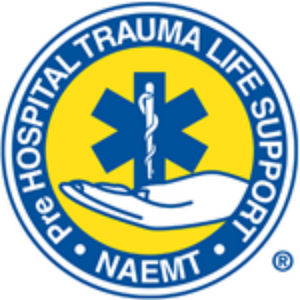
PHTLS HYBRID Provider
Continuing Ed course
**PLEASE NOTE THIS IS A HYBRID CLASS. CONTACT Billy.McDonald@siemt.info for the information on how to sign up for the online component. Signing up here is ONLY for the skills. ALL students must complete the didactic lessons online and show their certificates on the day of the skill class**
The Pre-Hospital Trauma Life Support (PHTLS) course is recognized around the world as the leading continuing education program for prehospital emergency trauma care. The mission of PHTLS is to promote excellence in trauma patient management by all providers involved in the delivery of prehospital care. The book is included with the course. This course is designed for the EMS student and promotes critical thinking as the foundation for providing quality care. Some of the course topics include:
- Physiology of life and death
- Scene assessment
- Patient assessment
- Airway
- Breathing, ventilation and oxygenation
- Circulation, hemorrhage and shock

Virtual Paramedic Refresher
Refresher course
Please note this virtual Zoom refresher will be held on the following dates. 11/25, 12/2, and 12/9 from 08:30-16:30. The completion of the remaining 7 hours can be discussed by emailing Billy.McDonald@siemt.info. The cost is $190.
This 31-hour NAEMT Paramedic refresher is designed to meet NREMT ALS CEU “National Component” recertification requirements. In addition, this course, coupled with other CEU/CME hours offered by the NAEMT such as PHTLS or AMLS, as well as various others CEU/CME hours such as ACLS, CPR, and PALS, will meet the recertification requirements for the States of New Jersey and New York as well as many other states.
(Check with your State EMS Office for clarification)The course includes the following topics;
1. Airway- 3.5 hours
2. Cardiology- 8.5 hours
3. Trauma- 3.75 hours
4. Medical- 8.75 hours
5. Operations- 6.5 hoursAll NAEMT continuing education courses are accredited by the Commission on Accreditation for Prehospital Continuing Education (CAPCE) and recognized by the National Registry of EMTs (NREMT).

Virtual EMT Refresher
Refresher course
This 21.75-hour NAEMT EMT refresher is designed to meet BLS CEU requirements for the NREMT recertification. In addition, this course, coupled with other CEU/CME hours offered by the NAEMT such as PHTLS or AMLS, as well as various others CEU/CME hours will meet the recertification requirements for the States of New Jersey and New York as well as many other states.
(Check with your State EMS Office for clarification)The course includes the following topics;
1. Airway- 1.5 hours
2. Cardiology- 6 hours
3. Trauma- 1.5 hours
4. Medical- 6 hours
5. Operations- 5 hoursPlease note the dates for November are 11/10, 11/12, and 11/13 from 0900-16:30
Please note the dates for December are 12/9, 12/10, and 12/11 from 0900-16:30All NAEMT continuing education courses are accredited by the Commission on Accreditation for Prehospital Continuing Education (CAPCE) and recognized by the National Registry of EMTs (NREMT).

PHTLS
Healthcare Professional course
The Pre-Hospital Trauma Life Support (PHTLS) course is recognized around the world as the leading continuing education program for prehospital emergency trauma care. The mission of PHTLS is to promote excellence in trauma patient management by all providers involved in the delivery of prehospital care. The book is included with this course. This course is designed for the EMS student and promotes critical thinking as the foundation for providing quality care. Some of the course topics include:
- Physiology of life and death
- Scene assessment
- Patient assessment
- Airway
- Breathing, ventilation and oxygenation
- Circulation, hemorrhage and shock

PTEP
Healthcare Professional course
The Psychological Trauma in EMS Patients (PTEP) course educates EMS practitioners about the biological underpinnings of psychological trauma, the short and long-term impact on the brain and body, and warning signs that a patient is experiencing extreme psychological distress. EMS practitioners are also taught strategies and techniques to alleviate patients’ distress and help patients cope with what they’re experiencing to ward off lingering effects.
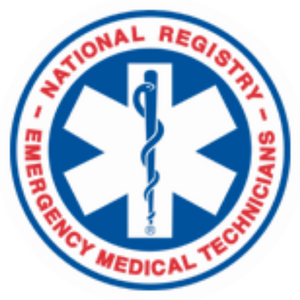
NRP Recertification
Healthcare Professional course
The NAEMT Paramedic refresher course is built from NAEMT’s evidence-based continuing education courses, including Prehospital Trauma Life Support (PHTLS), Advanced Medical Life Support (AMLS), Emergency Pediatric Care (EPC), Geriatric Education for EMS (GEMS), and EMS Safety. Applicable portions of these courses have been incorporated into the schedule of each refresher course.
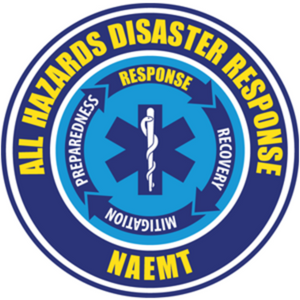
AHDR
Healthcare Professional course
The All Hazards Disaster Response (AHDR) course teaches students how to respond to the many types of disaster scenarios they may encounter, including natural disasters and infrastructure failings, fires and radiological events, pandemics, active shooter incidents, and other mass casualty events. AHDR educates participants on how to analyze potential threats in their area, assess available resources, and create a response plan that will save lives.
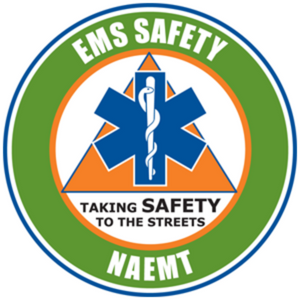
EMS Safety
Healthcare Professional course
EMS Safety teaches students how to protect themselves and their patients while on the job. It promotes a culture of safety and helps reduce the number of on-the-job fatalities and injuries. EMS Safety is the only national, comprehensive safety course for EMS practitioners. Its interactive format features real-life case studies and compelling discussions on current safety issues and provides students with a forum to share their own experiences. Course activities allow students to apply critical thinking and best safety practices to EMS scenarios.

AMLS
Healthcare Professional course
Advanced Medical Life Support (AMLS) remains the gold standard of education for emergency medical assessment and treatment. This course is appropriate for EMTs, paramedics, nurses, nurse practitioners, physician assistants, nurse anesthetists and physicians. Students will learn to recognize and manage common medical crises through realistic case-based scenarios that challenge students to apply their knowledge to highly critical patients. The course emphasizes the use of scene size-up, first impression, history, interactive group discussion on differential diagnosis and potential treatment strategies, and physical exam to systematically rule out and consider possibilities and probabilities in treating patients’ medical crises. Some discussion topics will include, respiratory disorders, cardiovascular disorders, shock, sepsis, neurological disorders, and environmental emergencies.
